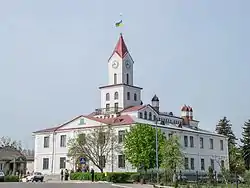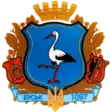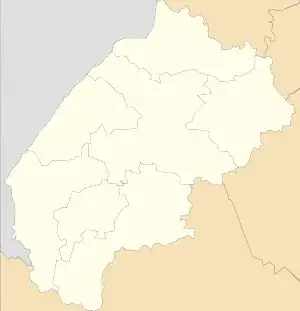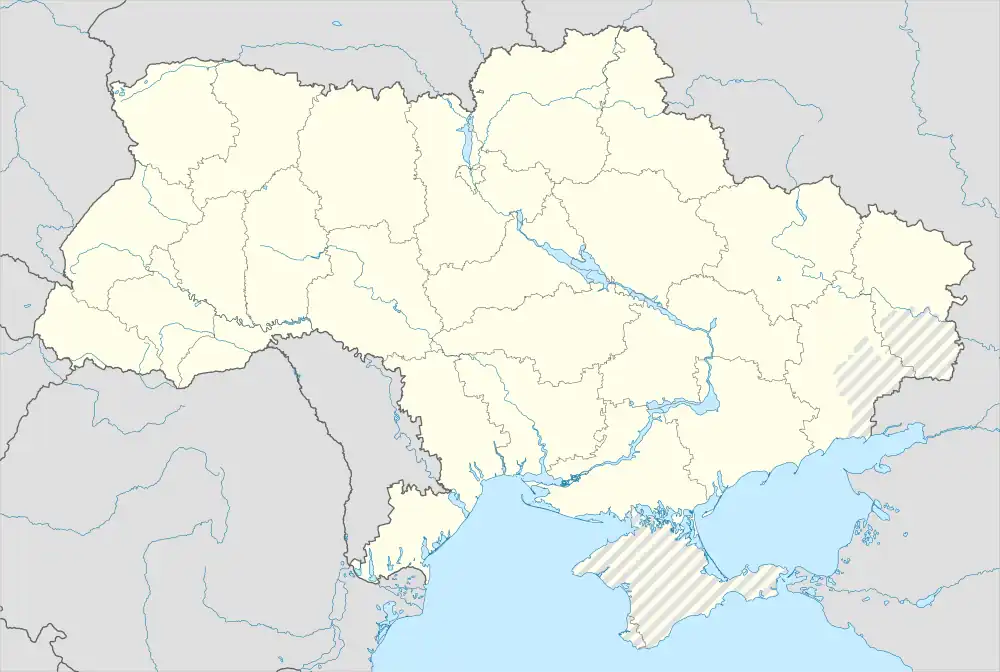Busk, Ukraine
Busk (Ukrainian: Буськ; Polish: Busk) is a city located in Zolochiv Raion in Lviv Oblast (region) of western Ukraine. It hosts the administration of Busk urban hromada, one of the hromadas of Ukraine.[1] Population: 8,662 (2022 estimate).[2]
Busk
Буськ | |
|---|---|
 The Busk City Council. | |
 Coat of arms | |
 Busk  Busk | |
| Coordinates: 49°58′0″N 24°37′0″E | |
| Country | |
| Oblast | |
| Raion | Zolochiv Raion |
| Area | |
| • Total | 9.0 km2 (3.5 sq mi) |
| Population (2022) | |
| • Total | 8,662 |
| • Density | 960/km2 (2,500/sq mi) |
| Time zone | UTC+2 (EET) |
| • Summer (DST) | UTC+3 (EEST) |
| Postal code | 80500—80505 |
| Area code | +380-3264 |
| Sister cities | Ropczyce |
Until 18 July 2020 it was the administrative center of the Busk Raion, now disestablished.
Busk was the birthplace of Yevhen Petrushevych, the president of the West Ukrainian National Republic.
History
_1.jpg.webp)
Busk has a long history. First mentioned in 1097 in Primary Chronicle as Bug City (Ruthenian: бужьсъкъ городъ, buzhesk horod) in the context of the dispute between Rus' princes for border area between Principality of Halych and Volhynian principality.[3] Bug City was named due to its location near Western Bug which locally is known as Bug river.
Busk was granted town charter in 1411 by Siemowit IV, Duke of Masovia. In the Polish–Lithuanian Commonwealth, it belonged to the Belz Voivodeship, and was the seat of a separate administrative unit, the Land of Busk. The town remained part of Poland until the first partition of Poland (1772), when it was seized by the Habsburg Empire, and remained in Austrian Galicia until late 1918. In the interwar period, Busk belonged to Kamionka Buska County, Tarnopol Voivodeship, until Soviet invasion of Poland (September 1939). In 1913, the population of Busk was 8,000, including 3,500 Poles, 2,700 Jews and 1,800 Ukrainians.
Busk had a very active Jewish community before World War II. The first synagogue was built in 1502.[4] The old Jewish cemetery was renowned. On July 1, 1941, German forces occupied Busk. The Jewish population was transferred to a ghetto then murdered on May 21, 1943. 1500 Jews perished during this operation.[4] A witness recalled of the executions of the Jews, "All middle-aged Jews were gathered to work. Then, they were taken to the execution site...while others dug the pits."[5] Raisel Meltzak, a Jewish child from Busk, was among the first Holocaust survivors to have her testimony recorded when she was interviewed by David P. Boder at a home for displaced Jewish orphans in France on September 8, 1946.[6]
Until 18 July 2020, Busk was the administrative center of Busk Raion. The raion was abolished in July 2020 as part of the administrative reform of Ukraine, which reduced the number of raions of Lviv Oblast to seven. The area of Busk Raion was merged into Zolochiv Raion.[7][8]
Notable people
References
- "Буская городская громада" (in Russian). Портал об'єднаних громад України.
- Чисельність наявного населення України на 1 січня 2022 [Number of Present Population of Ukraine, as of January 1, 2022] (PDF) (in Ukrainian and English). Kyiv: State Statistics Service of Ukraine. Archived (PDF) from the original on 4 July 2022.
- ПСРЛ. — Т. 2. Hypatian manuscript. — СПб., 1908. — Ст. 241
- Porteur de mémoires, Père Patrick Desbois, Flammarion 2007
- "Execution Sites of Jewish Victims Investigated by Yahad-In Unum". Yahad-In Unum Interactive Map. Retrieved 23 January 2015.
- Interview with Raisel Meltzak
- "Про утворення та ліквідацію районів. Постанова Верховної Ради України № 807-ІХ". Голос України (in Ukrainian). 2020-07-18. Retrieved 2020-10-03.
- "Нові райони: карти + склад" (in Ukrainian). Міністерство розвитку громад та територій України.